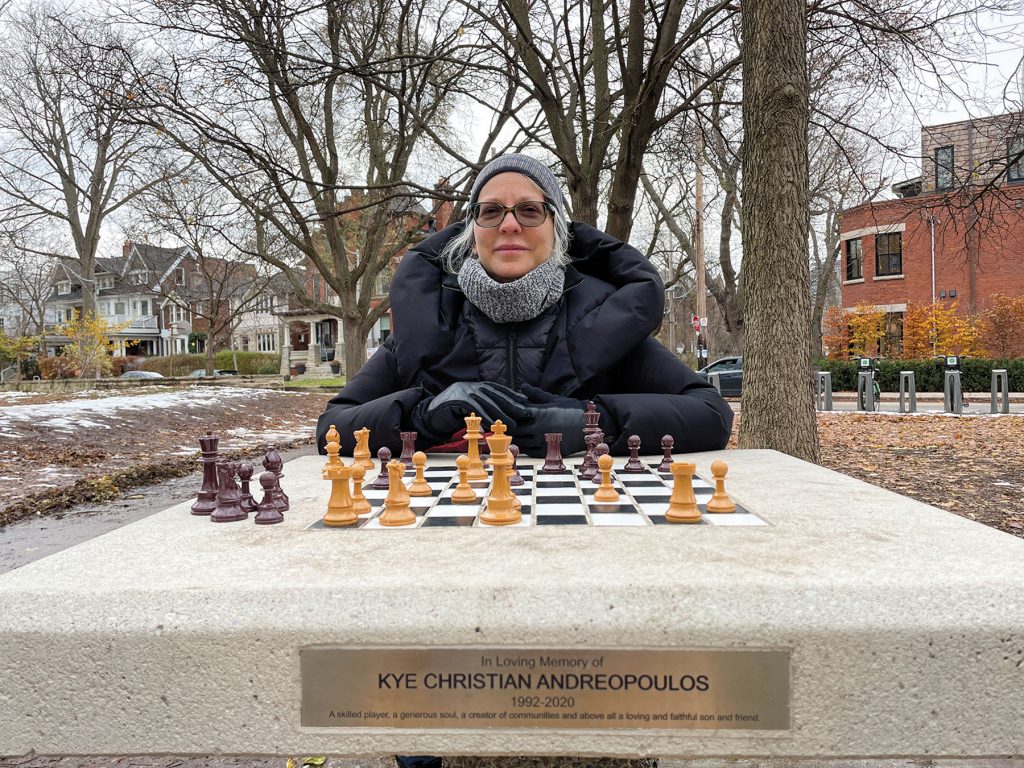Suicide seen as collateral damage during COVID-19

By Nicole Stoffman
Local park goers may have noticed a new chess table at Jean Sibelius Square. It is dedicated to the memory of Kye Christian Andreopoulos, “A skilled player, a generous soul, a creator of communities, and above all, a loving and faithful son and friend.”
Mr. Andreopoulos took his own life during the second wave of the pandemic, due to failures in our under-resourced mental health system, stretched to the breaking point by the pandemic, said his mother, Christine. “I truly think that if it wasn’t for COVID, he would be here,” she said.
He developed bipolar disorder (BD) a few years into a promising career as a business analyst. According to his mother, the stress of working in IT, running a business on the side, experiencing a break-up, and smoking pot to self-medicate triggered his first episode in 2017.
There is no known single cause of BD, but research points to changes in how some nerve cells in the brain communicate. This increases vulnerability to stress, so that upsetting experiences or substance use can trigger episodes, according to the Mood Disorders Association of Ontario.
A 2020 survey conducted by the Canadian Mental Health Association showed that suicidal thoughts or feelings rose 27% during wave 2, among people with pre-existing mental health conditions. Ms. Andreopoulos told the Gleaner that she believes his life could have been saved if he had access to appropriate care.
Ms. Andreopoulos described getting help for her son during the pandemic as a “horror story.” As an outpatient at CAMH, she says, he would have to wait five or six hours every week to see a different psychiatrist. Those appointments would usually last for 20-30 minutes.
She says she finally screamed and cried for one psychiatrist to work with her son. In response, a third-year student resident in the Moods and Disorders clinic was assigned to work with him that very same day.
Mr. Andreopoulos had 30-minute online appointments with the resident, every 2-3 weeks. His mother persisted in asking for in-person, more frequent psychotherapy. On their website, CAMH recommends psychotherapy, alongside medication, as the treatment for BD. Before the pandemic, Ms. Andreopoulos said her son had been “on a good road,” while getting in-person care at the Stratford Hospital, where he had travelled during a manic episode.
“Kye needed therapy to deal with everything that was going on in his life,” she said. “He was getting divorced, living with his mom, feeling dependent. He needed to cope with his thoughts and his depression and his weight gain. He was obese. He needed so much more than medication.”
Kye Andreopoulos took his own life, Dec 29, 2020. He was 28 years old.
He left his mother a suicide note. “The tragedy is that he didn’t feel there was anyone who could help him,” she said. “And that’s what he said. And that’s the unfortunate thing, is to die thinking that way.”
Ms. Andreopoulos says that she was looking for alternatives to CAMH prior to her son’s death, but could not get him into residential long-term care because they were not accepting patients due to COVID-19. She adds that she was not able to get him in to see a private therapist, because he was an adult, and had to make the request himself and was not motivated to at the time. She was not told by the resident that she could apply to be a Substitute Decision Maker (SDM), for this purpose.
The Gleaner was unable to corroborate Ms. Andreopoulos’ story because CAMH declined to comment on the case, citing patient confidentiality. CAMH also declined to answer the Gleaner’s more general questions in relation to their suicide protocol, and whether they experienced a shortage of psychiatrists during the pandemic.
Ms. Andreopoulos says she came up with the idea of the chess tables one day as she was walking through Sibelius Park.
“Kye loved the chess culture in cities like New York, where strangers can meet over a game. I think Kye would have sat down, and he would have played anybody,” she said. “And maybe if he made that one connection in the park one day, maybe that would have been it. A mom can only do so much.” Kye’s father, Chris, passed away from cancer in 2007, when Kye was 14.
She reached out to Councillors Layton and Bilão in June. By September 16, the project was complete. Two chess tables and a bench were placed in Dovercourt Park, Kye’s local park, and one chess table was at Jean Sibelius Square, his childhood park.
“It should not need to take an increase in deaths to act,” Councillor Layton told the Glaner. “And the province continually works to reduce access to these integral supports.”
Ms. Andreopoulos buried Kye’s baby teeth under the bench in Dovercourt Park. She says she hopes the community will enjoy the chess tables, but also be reminded that it’s ok to talk openly about mental health.
“I think what she did is pretty amazing,” said Michael Sutton, at the Chess Institute of Canada. “There’s a huge mental health aspect to chess. It’s a great way to teach kids about decision-making. You can stop kids from going down these dark paths, and making choices they can’t come back from.”
Ms. Andreopoulos has sold her house and is off on a journey. She is going to hike a rock formation in Scotland that her son didn’t finish climbing when he was studying at the University of St. Andrews. She will walk the Camino de Santiago, beginning on Kye’s birthday, and plans to work on a turtle reservation. She will scatter his ashes everywhere she goes.
If you or someone you know is experiencing suicidal thoughts or behaviours, call Distress Centres of Greater Toronto at 416-408-4357 or text 45645. If it is an emergency, call 911.
